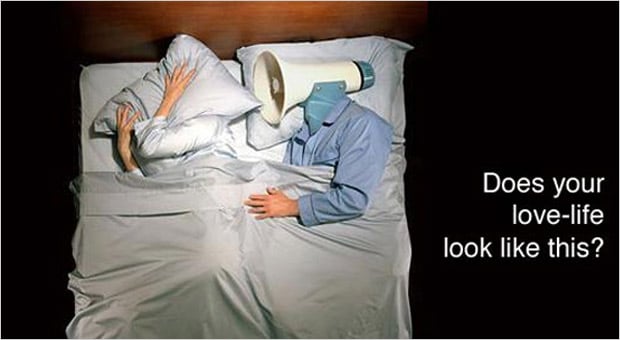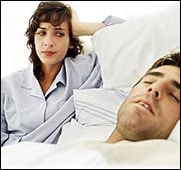Dreadful days, sleepless nights

What if we told you all of this could be linked to TMJ? There is often an over-looked yet equally as serious connection between breathing and airway problems and an unaligned jaw (TMJ).
Connection between TMJ and airways

First off, let’s explain sleep apnea. Sleep apnea is a serious sleep disorder that occurs when a person’s breathing is interrupted during sleep, due to breathing airways being blocked or restricted. People with untreated sleep apnea stop breathing repeatedly during their sleep, sometimes hundreds of times. A lot of times, those suffering from sleep apnea are often unaware they even have it. It takes a bed partner or someone else to alert them to the situation.
Tongue – get out of the way!
Your tongue is attached to your lower jaw and when your bite is un-aligned, your tongue acts as a pillow. It cushions the jaw and helps it to relax. An imbalance in your bite affects the size of your mouth and the altered size of your mouth no longer accommodates your tongue. Your tongue can’t sit where it should. If your tongue rests too far back in your mouth, it will block the air getting to your lungs.
When you snore or if you suffer from sleep apnea, it can have a direct correlation to your TMJ. Snoring can increase in people that have a severe and deep overbite. When your upper teeth cover your lower teeth, it may mean that your tongue is forced back in your mouth. This restricts your breathing airways and compounds your snoring and sleep apnea.
Compounded affects of sleep apnea

Sleep apnea is a medical condition affecting the quantity and quality of the sleep you get every night. If you are experiencing substantialdisturbances in your normal sleep patterns, you will suffer the consequences. If and you don’t get enough sleep, it might be obvious that you could feel sleepy during the day and your concentration and daytime performance could suffer. But sometimes the consequences of sleep apnea are more difficult to notice; and sometimes people do not realize that the symptoms they do notice, could be caused by sleep apnea.
Sleep apnea frequently:
- causes depression
- causes anxiety
- causes stress
- causes irritability and aggressive behavior
- causes memory and concentration difficulties
- decreases lifespan (on average reduced by 20 years if sleep apnea unteated)
- raises blood pressure
- increases risk for atrial fibrillation
- increases risk for stroke by 8x (2x as much as high blood pressure or diabetes does)
- increases risk for heart attack by 23x (>3x as much as smoking or high blood pressure does)
- increases risk of congestive heart failure
- decreases blood flow to the brain (night and day)
- impairs concentration and memory (imaging brain shows permanent changes similar to Alzheimer’s)
- causes impotence
- causes acid reflux
- causes obesity and type 2 diabetes
- increases anxiety
- causes teeth clenching and grinding, leading to deterioration of teeth, muscle tension headaches and aggrevation of TMJ/TMD symptoms
- causes morning headaches from buildup of excessive carbon dioxide in lungs
- increases stress, irritability and aggressive behavior
- causes depression
- causes lowered pain tolerance
- suppresses the immune system
- impairs healing and growth
- causes nocturia (waking up to get up in the night to urinate)
- causes enuresis (bed wettting) in children
Waking up unrefreshed and exhausted every morning could be a consequence of your ongoing struggle with TMJ. Sleepless nights and jaw problems might seem to be unrelated but it could be the link and the answer you are looking for.
